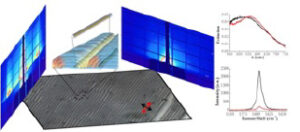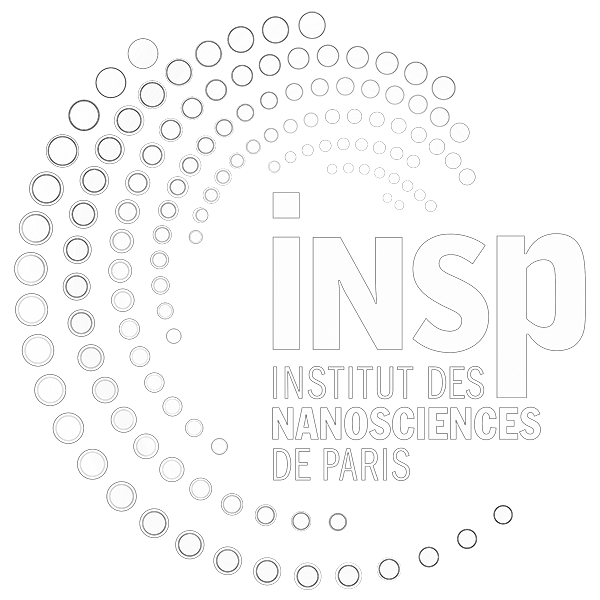Members
- Permanent members: Emmanuelle Lacaze, Sébastien Royer, Michel Goldmann, Emmanuel Lhuillier
We use dedicated liquid crystal topological defects to confine nanoparticles in 1 Dimension (using liquid crystal smectic dislocations) or in 2 Dimensions (using ribbon-like liquid crystal smectic grain boundaries). Nanoparticles self-organize and build new kinds of close-packed networks. Combining Polarized Optical Microscopy, Fluorescence Microscopy, UV-Visible Spectrophotometry and synchrotron GISAXS, we have shown that the confined nanoparticles sequentially self-organize in chains, then in ribbon-like 2D networks (hexagonal networks for nanospheres), the proportion of both types being driven by nanoparticle concentration. Both types of nanoparticle organizations are strictly oriented by the liquid crystal topological defects

Caption: Scheme of chains of gold nanospheres confined in smectic toplogical defects and measured combining Optical Microscopy (below), ellipsometry (above), GISAXS (on the left and right), spectrophotometry (right top) and Raman spectroscopy (right bottom).
These nanoparticle organizations are now the ideal platform for accurate studies of the role of electromagnetic coupling between nanoparticles for the control of their optical properties.
We currently explore how the above-described networks allow for gold nanoparticles (nanosphere and nanorods) to induce highly anisotropic light absorption through plasmonic resonance controlled by light polarization. With semi-conducting fluorescent nanoparticles, we study how energy exchanges within the networks allow for a control of the localization of light emission. We will combine metallic and semi-conducting nanoparticles for a thorough study of Purcell effect with oriented nanoparticles. Finally we will take advantage of the easy actuation of the liquid crystal matrix to control the nanoparticle organizations with an external electric field or with temperature
Collaborations
- B. Gallas, L. Coolen (INSP)
- S. Kralj, L. Mesarec (Univ. Maribor – Slovenia)
- R. Kamien (UPenn – USA)
- J. De Pablo (Univ. Chicago – USA)
- C. Rosenblatt (Univ. Cleveland – USA)
- D. K. Yoon (Kaist – South-Corea),
- H. Ayeb (Univ Tunis – Tunisia)
PhD
- Delphine Coursault, “Decoration of linear smectic defects by gold nanoparticles”. Defense: March 2013.
- Joel Pendery (co-direction with Univ. Cleveland, USA). Defense: April 2014
- Laurent Pelliser, “Assembly and organization of semiconductor nanoparticles in topological defect networks in liquid crystal”. Defense: June 2016.
- Ines Gharbi (co-direction with Univ. of Tunis, Tunisia), “Polymerized liquid crystal films and self-organization of gold nanoparticles”. Defense: July 2018.
- Syou P’heng Do, “Liquid crystal/nanoparticle composites, synergies between soft matter and electronic properties of nanoparticles”. Defense: January 2019.
Publications
- Habib Ayeb, Mouna Derbali, Ahmed Mouhli, Taoufik Soltani, Fathi Jomni, et al.. Viscoelastic and dielectric properties of 5CB nematic liquid crystal doped by magnetic and nonmagnetic nanoparticles. Physical Review E , American Physical Society (APS), 2020, 102 (5), ⟨10.1103/PhysRevE.102.052703⟩. ⟨hal-03070728⟩
- Syou-P’Heng Do, Amine Missaoui, Alessandro Coati, Andrea Resta, Nicolas Goubet, et al.. Interactions Between Topological Defects and Nanoparticles. Frontiers in Physics, Frontiers, 2020, 7, pp.234. ⟨10.3389/fphy.2019.00234⟩. ⟨hal-02490728⟩
- Syou P’Heng Do, Missaoui Amine, Alessandro Coati, Delphine Coursault, Haïfa Jeridi, et al.. From Chains to Monolayers : Nanoparticle Assembly Driven by Smectic Topological Defects. Nano Letters, American Chemical Society, 2020, ⟨10.1021/acs.nanolett.9b04347⟩. ⟨hal-02450544⟩
- Brigita Rožič, Jérôme Fresnais, Celine Molinaro, Joseph Calixte, Shivakumar Umadevi, et al.. Oriented Gold Nanorods and Gold Nanorod Chains within Smectic Liquid Crystal Topological Defects. ACS Nano, American Chemical Society, 2017, 11 (7), pp.6728-6738. ⟨10.1021/acsnano.7b01132⟩. ⟨hal-01551477⟩
- Ahmed Mouhli, Habib Ayeb, Tahar Othman, Jérôme Fresnais, Vincent Dupuis, et al.. Influence of a dispersion of magnetic and nonmagnetic nanoparticles on the magnetic Fredericksz transition of the liquid crystal 5CB. Physical Review E , American Physical Society (APS), 2017, 96 (1), pp.012706. ⟨10.1103/PhysRevE.96.012706⟩. ⟨hal-01569599⟩

